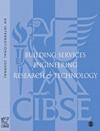建筑中的被动噪声控制:管道系统的工程案例研究
IF 1.8
4区 工程技术
Q3 CONSTRUCTION & BUILDING TECHNOLOGY
Building Services Engineering Research & Technology
Pub Date : 2021-05-17
DOI:10.1177/01436244211019635
引用次数: 2
摘要
建筑物中最常见的噪声源与暖通空调系统、管道系统、电气系统和外部源有关。建筑物中的被动噪声控制(PNC)技术已经以多种方式实现。这项工作的目的是分析消音器的使用,以减弱管道中的噪音,管道是建筑物、内燃系统、风扇、气体传导系统、锅炉等通风系统的一部分。消音器的主要目的是减少噪音的传播,尽可能少地干扰气体或液体的循环。在第一种情况下,消音器被分为反应式和耗散式,这分别取决于噪声的衰减是由反射机制还是耗散机制产生的。在反应式消声器中,损失主要是由于声波在阻抗不连续性中的反射,例如管的加宽或变窄。在耗散消声器中,气流与吸收材料的大表面接触。然后通过多孔材料中的粘热损失来产生噪声的衰减。在这项工作中,一个实际问题将通过在60中降低19 dBA来解决 赫兹。实际应用噪音是目前居住区的一个问题,可能会导致人们的健康问题。建筑物内这些噪音的来源多种多样,其中一种是由管道产生的。在现代建筑施工中应用PNC技术是一种很好的预防措施。因此,在该项目中,在住宅楼的管道中进行了PNC系统,这可以作为一个值得称赞的解决方案,避免了这些空间的居民面临的问题。本文章由计算机程序翻译,如有差异,请以英文原文为准。
Passive noise control in buildings: An engineering case study of ducted systems
The most common noise sources in buildings are related to Heating, Ventilating and Air Conditioning (HVAC) systems, plumbing systems, electrical systems and exterior sources. Passive Noise Control (PNC) techniques in buildings have been implemented in several ways. The aim of this work is to analyses the use of silencer to attenuate the noise in the ducts that are part of the ventilation systems in buildings, internal combustion systems, fans, gas conduction systems, boilers, etc. The main objective of a silencer is to reduce the transmission of noise, disturbing as little as possible the circulation of gas or liquid. In the first instance, the silencers are classified as reactive and dissipative, depending on whether the attenuation of the noise is produced by reflective or dissipative mechanisms, respectively. In a reactive silencer, the losses occur essentially due to the reflections of the sound waves in impedance discontinuities, such as widening or narrowing of the tube. In dissipative silencers, the flow is in contact with a large surface of absorbent material. The attenuation of the noise is then produced by visco-thermal losses in the porous material. In this work, a practical issue will be addressed with a noise reduction of 19 dBA in 60 Hz. Practical application Noise is a current issue in residential areas that could lead to health problems for people. The origin of these noises within buildings is very diverse, one of them is produced by ducts. Appling the PNC technique in modern building construction would be a good prevention practice. For this reason, in this project a PNC system was carried out in the ducts of a residential building, which could be used as a praiseworthy solution, avoiding problems for the inhabitants of these spaces.
求助全文
通过发布文献求助,成功后即可免费获取论文全文。
去求助
来源期刊

Building Services Engineering Research & Technology
工程技术-结构与建筑技术
CiteScore
4.30
自引率
5.90%
发文量
38
审稿时长
>12 weeks
期刊介绍:
Building Services Engineering Research & Technology is one of the foremost, international peer reviewed journals that publishes the highest quality original research relevant to today’s Built Environment. Published in conjunction with CIBSE, this impressive journal reports on the latest research providing you with an invaluable guide to recent developments in the field.
 求助内容:
求助内容: 应助结果提醒方式:
应助结果提醒方式:


